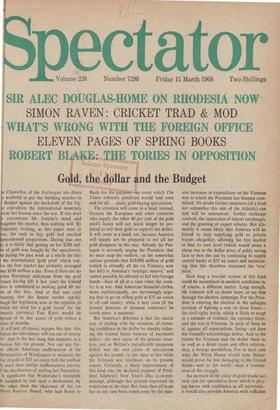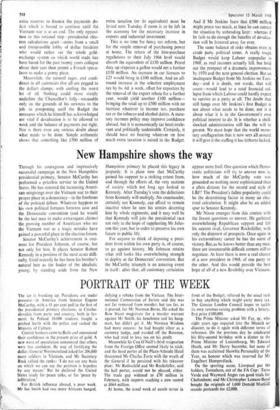Gold, the &liar and the Budget
):‘
e Chancellor of the Exchequer sits down s weekend to put the finishing touches to Budget against the backcloth of the big- t convulsion the international monetary tern has known since the war. If this does t concentrate Mr Jenkins's mind and engthen his resolve, then nothing will. By nesday evening, as this paper went to ss. the rush to buy gold had reached precedented proportions. During that one y it is likely that getting on for $200 mil- n of gold was bought by the speculators, d during the past week as a whole the loss the international `gold pool' which sup- 'es the free market has probably averaged )me $100 million a day. Even if there are no irther European defections from the pool ranee having left it last year) the United Lates is committed to making good 60 per fl.t of this loss. And at that rate (and isuming that the Senate ratifies rapidly tough the legislation now in the pipeline to )olish the need for a gold `cover' for the )mestic currency) Fort Knox would be nptied of its last ounce of gold within a .atter of months.
It will not, of course, happen like that. Not cause the speculators will run out of money 'st : that is the last thing that happens in a tuation like the present. Nor can any fur- er official American reaffirmation of the termination of Washington to maintain the ice of gold at $35 an ounce halt the outflow ly more than similar reaffirmations preven- cl the devaluation of sterling last November. is significant that Wednesday's stampede ss heralded by just such a declaration, by )ne other than the chairman of the us :dent Reserve Board, who had flown to Basle for the p t si-1:48n event which The Times solemnly predicted would 'end once and for all .. . panic gold-buying speculation.'
The situation will come to a head, instead, because the European and other countries who supply the other 40 per cent of the gold pool's losses will not much longer be pre- pared to sell their gold to support the dollar. It will come to a head, too, because America will simply not be prepared to see all her gold disappear in this way. Already the Pen- tagon is privately urging the President that he must stop the outflow, on the somewhat curious grounds that $10,000 million of gold (which is virtually all the us Treasury now has left) is America's `strategic reserve,' and cannot possibly be allowed to fall into foreign hands—least of all at a time when the coun- try is at war. And American financial circles. more sophisticatedly, are increasingly argu- ing that to go on selling gold at $35 an ounce to all and sundry, when it may soon (if the present pressure of demand continues) be worth more, is madness.
But America's dilemma is that the classic way of dealing with the situation, of restor- ing confidence in the dollar by sharply reduc- ing the United States balance of payments deficit—the root cause of the present situa- tion, just as Britain's ineradicable payments deficit was the root cause of speculation against the pound—is not open to her while the Vietnam war continues on its present course. Certainly, a sharp improvement of this kind was the declared purpose of Presi- dent Johnson's New Year's Day economic message, Although this journal expressed its scepticism at the time. But since then all hope has in any case been swept away by the mas- sive increases in expenditure on the Vietnam war to which the President has become com- mitted. No doubt further measures (of a kind not unfamiliar this side of the Atlantic) can and, will be announced : further exchange controls, the imposition of import surcharges, and the granting of export rebates. But ulti- mately it seems likely that America will be forced to stop supplying gold to private buyers altogether, allowing the free market to find its own level (which would mean a sharp rise in the dollar price of gold), saving face as best she can by continuing to supply central banks at $35 an ounce and maintain- ing that this therefore remained the 'true' price.
How long a two-tier system of this kind could be maintained in modern conditions is, of course, a different matter. Long enough. Mr Johnson will no doubt hope, to see him through the election campaign. For the Presi- dent is entering the election in the unhappy position of fighting a war on three fronts— the civil rights battle, which is likely to erupt in a summer of violence; the currency front; and the war in Vietnam. In each of them he is, against all expectations, losing—yet dare not formally acknowledge defeat. And in the battles for Vietnam and the dollar there is. as well as a direct cause and effect relation- ship, a strange parallelism. For in each case what the White House would term `defeat' would prove far less damaging to the United States—and to the world—than a continu- ance of the struggle.
An increase in the price of gold would not only end the speculative fever which is play- ing havoc with confidence in all currencies . it would also provide America with sufficient extra reserves to finance the payments de- ficit which is bound to continue until the Vietnam war is at an end. The only opposi- tion to this rational step—presidential elec- tion calculations apart—stems from a small and irresponsible lobby of dollar fetishists who would rather see the whole gold- exchange system on which world trade has been based for the past twenty years collapse about their ears than permit a French specu- lator to make a penny piece.
Meanwhile, the turmoil rages, and confi- dence in all currencies (for all are pegged to the dollar) slumps, with sterling the worst hit of all. Nothing could more vividly underline the Chancellor's folly—excusable only on the grounds of his newness to the job—in postponing until the Budget the measures which he himself has acknowledged are vital if devaluation is to be allowed to work and the balance of payments put right. Nor is there even any serious doubt about what needs to be done. Simple arithmetic shows that something like £500 million of extra taxation .(or its equivalent) must be levied next Tuesday if room is to be left in the economy for the necessary increase in exports and industrial investment.
This is no time for fancy tax reform, but for the simple removal of purchasing power at home. The return of the hire-purchase regulations to their July 1966 level would absorb the equivalent of £150 million. Petrol duty up sixpence a gallon would net a further £150 million. An increase in car licences to £25 would bring in £100 million. And an all- round increase in the selective employment tax by 6s. 6d. a week, offset for exporters by the renewal of the export rebate for a further year, would yield another £100 million— bringing the total up to £500 million with no increase whatever in income tax, purchase tax or the tobacco and alcohol duties. A statu- tory incomes policy may improve confidence abroad, but it is economically (at best) irrele- vant and politically undesirable. Certainly, it should have no bearing whatever on how much extra taxation is raised in the Budget. And if Mr Jenkins fears that £500 million might prove too much, at least he can correct the situation by unbending later: whereas if he fails to do enough the benefits of devalua- tion will be frittered away for ever.
The same balance of risks obtains even in crude party political terms. A really tough Budget would keep Labour unpopular in 1968, as real incomes actually fell, but hold out the prospect of a dramatic improvement by 1970 and the next general election. But an inadequate Budget from Mr Jenkins on Tues- day—and it is deeds, not words, that will count—would lead to a total financial col- lapse from which Labour could hardly expect to survive as a party at all. The doubt that still hangs over Mr Jenkins's first Budget is not about what needs to be done, nor is it about what it is in the Government's own political interest to do. If is whether a shell- shocked administration still has the will to govern. We must hope that the world mone- tary conflagration that it now sees all around it will give it the stuffing it has hitherto lacked.











































